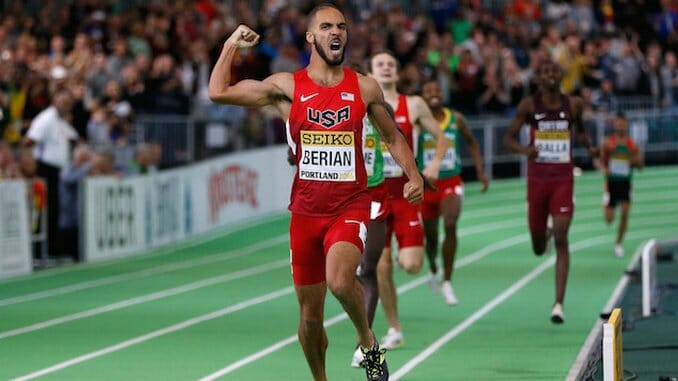Before He Can Medal in Rio, Boris Berian Has to Get Through Nike
Photos courtesy Getty Images
While no American distance runner should be considered a lock for a medal in Rio, Boris Berian is about as safe a bet as you can find. But before he gets a chance to even go out for the Olympic squad, he’ll have to get through Nike and its lawyers first.
A little more than a year removed from a day job at McDonald’s, Berian has established himself as a middle-distance running star. In March, the Adams State University dropout won gold in the 800 meter run at the World Indoor Championships in Portland, Oregon. (His personal best in the event, 1:43.34, set at the 2015 Herculis meet in Monaco, makes him the fifth-fastest American ever at that distance.)
After being crowned world indoor champion in Portland, Berian set his sights on Olympic gold in Rio de Janeiro. He opened his season on April 30 in Des Moines, Iowa, where he ran 1:47.29 to finish second at the Drake Relays.
But on May 20, his outdoor season would be derailed at a meet he wasn’t even competing in. Berian went to the Hoka One One Middle Distance Classic in Los Angeles to cheer on his Big Bear Track Club teammates; Nike served him with a lawsuit at the meet.
Im currently not in any contract. My Nike sponsorship ENDED last year. Nike FAILED to match NB offer. For some reason Nike is fighting that.
— Boris Berian (@borisgump800) 22 de mayo de 2016
Today, I got served at the Hoka Classic, @nike is going to sue me for breach of a contract that expired on 12/31/15. What shall I do?
— Boris Berian (@borisgump800) 21 de mayo de 2016
According to court documents, Nike claims that Berian breached his contract with them by signing with New Balance in January. While Nike’s contract with Berian expired on December 31, a clause in the contract allows Nike to match any offer made in the next 180 days.
Court documents show that on January 19, Berian’s agent Merhawi Keflezighi had informed Nike that Berian had agreed to a contract with New Balance worth at least $375,000 over three years, an amount that could increase with bonuses for performance. Nike claims that they matched this contract on January 22, meaning Berian would remain a Nike athlete.
In statement submitted to the court on June 17, Keflezighi made public the full contract Nike offered to Berian in response to the New Balance offer. That contract contained eight reduction clauses, each one threatening to reduce Berian’s contract between 20 and 50 percent. These reduction clauses are the reason that the Berian camp claims the Nike offer is not equal to the New Balance offer.
-

-

-

-

-

-

-

-

-

-

-

-

-

-

-

-

-

-

-

-

-

-

-

-

-

-

-

-

-

-

-

-

-

-

-

-

-

-

-

-








































